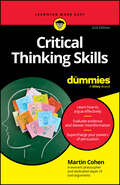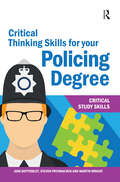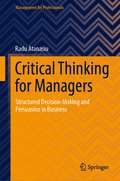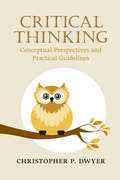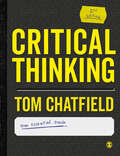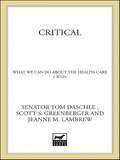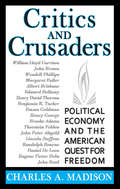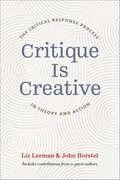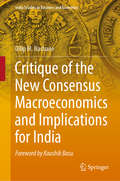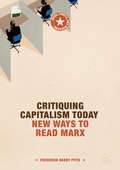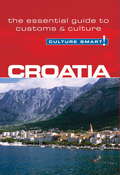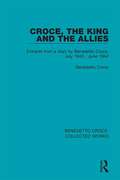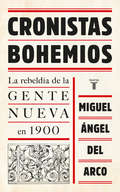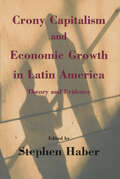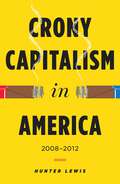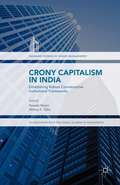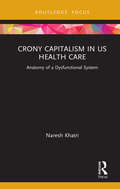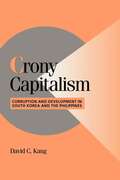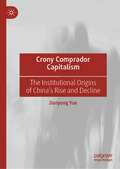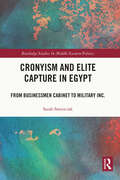- Table View
- List View
Critical Thinking Skills For Dummies
by Martin CohenLearn how to argue points effectively, analyze information, and make sound judgments The ability to think clearly and critically is a lifelong benefit that you can apply in any situation that calls for reflection, analysis, and planning. Being able to think systematically and solve problems is also a great career asset. Critical Thinking Skills For Dummies helps you hone your thinking abilities and become a better communicator. You’ll find hands-on, active instruction and exercises that you can put to work today as you navigate social media and news websites, chat with AI, fact-check your own and others’ views, and more. Become a thinking machine, with this Dummies guide. Identify other people’s arguments and conclusions—and spot holes in them Evaluate evidence and produce more effective arguments in any situation Read between the lines of what people say and form your own judgments Apply critical thinking to school or college assignments to improve your academic performance This is the perfect Dummies title for students, researchers, and everyone who seeks to improve their reasoning and analysis ability.
Critical Thinking Skills for your Policing Degree (Critical Study Skills)
by Martin Wright Jane Bottomley Steven PryjmachukIf you are embarking on a university criminology, policing or other law enforcement professional degree, the books in this series will help you acquire and develop the knowledge, skills and strategies you need to achieve your goals. They provide support in all areas important for university study, including institutional and disciplinary policy and practice, self-management, and research and communication. Tasks and activities are designed to foster aspects of learning which are valued in higher education, including learner autonomy and critical thinking, and to guide you towards reflective practice in your study and work life.Critical Thinking Skills for your Policing Degree provides you with a sound knowledge and understanding of: the nature of critical thinking, and of its relevance and importance in HE how to adopt a critical approach to all aspects of your policing studies the importance of active, critical reading, and how it allows you an efficient, principled, effective assessment of the literature in your field the need to adopt a critical approach to writing, characterised by analytical and evaluative use of sources and the development of your own ‘voice’.
Critical Thinking for Managers: Structured Decision-Making and Persuasion in Business (Management for Professionals)
by Radu AtanasiuThis book discusses critical thinking as a tool for more compassionate leadership, presenting tried and tested methods for managing disagreement, for anticipating and solving problems, and for enhancing empathy. Employing a lighter tone of voice than most management books, it also shows how and when less-than-rational mechanisms such as intuition and heuristics may be efficient decision-making tools in any manager’s toolbox. Critical thinking is useful for analyzing incoming information in the context of decision-making and is crucial for structuring outgoing information in the context of persuasion. When trying to convince a client to buy a service, an executive board to fund a project, or a colleague to change a procedure, managers can use the simple step-by-step guides provided here to prepare for successful meetings and effective pitches.Managerial thinking can be steadily improved, using a structured process, especially if we learn to think about our thinking. This book guides current and would-be managers through this process of improving and metathinking, in connection with decision-making and persuasion. Using examples from business, together with research insights from Behavioral Economics and from Management and Organizational Cognition, the author illustrates common pitfalls like hidden assumptions and cognitive biases, and provides easy-to-use solutions for testing hypotheses and resolving dilemmas.
Critical Thinking in Human Resource Development (Routledge Studies in Human Resource Development #Vol. 12)
by Carole Elliott Sharon TurnbullThis book provides a reflexive critique of the assumptions of orthodox HRD research and practice and questions the conception of humans as resources, as well as the conventional performative focus of HRD. Examining the broader social, political and economic contexts, the book offers alternative perspectives for considering both the needs of individuals and the sustainable development of organizations in post-industrial economies.
Critical Thinking: Conceptual Perspectives and Practical Guidelines
by Christopher P. DwyerOrganizational Behavior provides insight into OB concepts and processes through a first-of-its-kind active learning experience. Thinking Critically challenge questions tied to Bloom's taxonomy appear throughout each chapter, challenging you to apply, analyze, and create. Unique, engaging case narratives that span several chapters along with experiential exercises, self-assessments, and interviews with business professionals foster your abilities to think critically and creatively, highlight real-world applications, and bring OB concepts to life. The authors provide a "big picture" framework that illustrates how individual processes, team processes, influence processes, and organizational processes impact important organization outcomes such as individual performance, job satisfaction, team performance, and organizational performance. Rich with thought-provoking content and practical applications, you will walk away with critical thinking skills that help you make effective and thoughtful decisions. Key Features: Critical-thinking approach equips you with the mindset and skills needed to thrive in today's complex organizations Rich, extended case study narratives inspired by real people and real events illustrate OB concepts and critical thinking in action A robust chapter on leadership examines classic leadership theories and timely approaches such as empowering leadership and servant leadership A unique chapter on creativity and innovation explores how managers can use creativity to solve problems, motivate employees, and inspire teams. Get the SAGE edge! SAGE edge offers a robust online environment featuring an impressive array of free tools and resources for review, study, and further exploration, keeping both instructors and students on the cutting edge of teaching and learning. Learn more at edge. sagepub. com/neckob
Critical Thinking: Your Guide to Effective Argument, Successful Analysis and Independent Study
by Tom ChatfieldWhat is critical thinking? How do you apply it in your assessments? How do you build a good argument or find evidence? Critical thinking is a set of techniques. You just need to learn them. This is your personal toolkit for demystifying critical thinking. Clear and focused, it shows you how to sharpen your ability to think critically by developing and honing your skills. You’ll learn how to: Build a solid argument and express your ideas clearly Evaluate evidence and identify errors Understand and account for biased or flawed thinking Become a savvy user of technology Sift through the deluge of digital information Develop confident critical writing. Designed to work with a power pack of digital resources and exercises, you′ll find practical and effective tools to think and write critically in an information-saturated age. Whether you′re starting your first degree or arriving as an international or mature student, this book equips you with the skills, insights and confidence to succeed. This second edition has been redesigned and fine-tuned with a focus on accessibility: with a new and improved layout to improve the eBook experience, and updated language, examples and further reading recommendations throughout.
Critical Thinking: Your Guide to Effective Argument, Successful Analysis and Independent Study
by Tom ChatfieldWhat is critical thinking? How do you apply it in your assessments? How do you build a good argument or find evidence? Critical thinking is a set of techniques. You just need to learn them. This is your personal toolkit for demystifying critical thinking. Clear and focused, it shows you how to sharpen your ability to think critically by developing and honing your skills. You’ll learn how to: Build a solid argument and express your ideas clearly Evaluate evidence and identify errors Understand and account for biased or flawed thinking Become a savvy user of technology Sift through the deluge of digital information Develop confident critical writing. Designed to work with a power pack of digital resources and exercises, you′ll find practical and effective tools to think and write critically in an information-saturated age. Whether you′re starting your first degree or arriving as an international or mature student, this book equips you with the skills, insights and confidence to succeed. This second edition has been redesigned and fine-tuned with a focus on accessibility: with a new and improved layout to improve the eBook experience, and updated language, examples and further reading recommendations throughout.
Critical Wage Theory: Why Wage Justice Is Racial Justice
by Ruben J. GarciaIn this highly original and personal book, Ruben J. Garcia argues forcefully that we must center the minimum wage as a tool for fighting structural racism. Employing the lessons of critical race theory to show how low minimum wages and underenforcement of workplace laws have always been features of our racially stratified society, Garcia explains why we must follow the leadership of social movements by treating increases in minimum wage levels and enforcement as matters of racial justice. Offering solutions that would benefit all workers, especially the immigrants and people of color most often made victims of wage theft, Critical Wage Theory is essential reading for anyone who seeks a more just future for the working class.
Critical: What We Can Do About the Health-Care Crisis
by Tom Daschle Scott S. Greenberger Jeanne M. LambrewA much-needed and hard-hitting plan, from one of the great Democratic minds of our time, to reform America's broken health-care system. Undoubtedly, the biggest domestic policy issue in the coming years will be America's health-care system. Millions of Americans go without medical care because they can't afford it, and many others are mired in debt because they can't pay their medical bills. It's hard to think of another public policy problem that has lingered unaddressed for so long. Why have we failed to solve a problem that is such a high priority for so many citizens? Former Senate Majority Leader Tom Daschle believes the problem is rooted in the complexity of the health-care issue and the power of the interest groups—doctors, hospitals, insurers, drug companies, researchers, patient advocates—that have a direct stake in it. Rather than simply pointing out the major flaws and placing blame, Daschle offers key solutions and creates a blueprint for solving the crisis. Daschle's solution lies in the Federal Reserve Board, which has overseen the equally complicated financial system with great success. A Fed-like health board would offer a public framework within which a private health-care system can operate more effectively and efficiently—insulated from political pressure yet accountable to elected officials and the American people. Daschle argues that this independent board would create a single standard of care and exert tremendous influence on every other provider and payer, even those in the private sector. After decades of failed incremental measures, the American health-care system remains fundamentally broken and requires a comprehensive fix. With his bold and forward-looking plan, Daschle points us to the solution.
Criticism, Art and Theory in 1970s Britain: The Critical War (ISSN)
by JJ CharlesworthA critical study of the life of art criticism in the 1970s, this volume traces the evolution of art and art criticism in a pivotal period in post-war British history.JJ Charlesworth explores how art critics and the art press attempted to negotiate new developments in art, faced with the challenges of conceptualism, alternative media, new social movements and radical innovations in philosophy and theory. This is the first comprehensive study of the art press and art criticism in Britain during this pivotal period, seen through the lens of its art press, charting the arguments and ideas that would come to shape contemporary art as we know it today.This book will be of interest to scholars working in art history, British cultural history and history of journalism.
Criticisms of Classical Political Economy: Menger, Austrian Economics and the German Historical School (Routledge Studies In The History Of Economics Ser.)
by Gilles CampagnoloThe role of the German Historical School and of Carl Menger (founder of the Austrian School) is appraised in this new book. This important period of the history of economics is vital to understand how the discipline developed over the next half-century. Gilles Campagnolo has produced an impressive original work which makes use of rarely seen research by Carl Menger and as such this book will be of interest across several discplines, including history of economic thought, economic methodology, philosophy of science and the history of ideas.
Critics and Crusaders: Political Economy and the American Quest for Freedom
by Wilton S. DillonThe quest for freedom has always been a defining characteristic of the American people. That neither constitutionalism nor capitalism has secured complete freedom for every person is demonstrated by media announcements of slavery, oppression, exploitation, and a variety of shortcomings in the economic system. That said, and as this volume seeks to demonstrate through a history of radical commentaries, there have always been bold spirits who fight for such ambitious heights.With changing times, freedom meant different things to those who worked for it. This book in its broadest sense is a history of libertarianism. Each of the libertarians in this full study, extending from William Lloyd Garrison to Eugene V. Debs, fought for the ideal of political economy as a practical ideal. In so doing these major figures at the margins of power expanded the entire field of human rights. Charles A. Madison concludes that radicalism became an ideology in the search for freedom.The zeal and activity of these figures did much to attain the political freedom and economic well- being that Americans are inclined to take for granted. These individual chapters are set in frames supplied by background sketches of the movements each group led, and the whole is an attempt to depict and re-evaluate America's social progress without the rigor or formality of impersonalized history.
Critique Is Creative: The Critical Response Process® in Theory and Action
by Liz Lerman John BorstelWinner of Silver Nautilus for Creativity & Innovation, given by Nautilus Book Award, 2023Devised by choreographer Liz Lerman in 1990, Critical Response Process® (CRP) is an internationally recognized method for giving and getting feedback on creative works in progress. In this first in-depth study of CRP, Lerman and her long-term collaborator John Borstel describe in detail the four-step process, its origins and principles. The book also includes essays on CRP from a wide range of contributors. With insight, ingenuity, and the occasional challenge, these practitioners shed light on the applications and variations of CRP in the contexts of art, education, and community life. Critique Is Creative examines the challenges we face in an era of reckoning and how CRP can aid in change-making of various kinds.With contributions from:Bimbola Akinbola, Mark Callahan, Lawrence Edelson, Isaac Gómez, Rachel Miller Jacobs, Lekelia Jenkins, Elizabeth Johnson Levine, Carlos Lopez-Real, Cristóbal Martínez, Gesel Mason, Cassie Meador, Kevin Ormsby, CJay Philip, Kathryn Prince, Sean Riley, Charles C. Smith, Shula Strassfeld, Phil Stoesz, Gerda van Zelm, Jill Waterhouse, Rebekah West
Critique of the New Consensus Macroeconomics and Implications for India (India Studies in Business and Economics)
by Dilip M. NachaneThe thought-provoking book presents alternative viewpoints to mainstream macroeconomic theory, questions conventional policy wisdom and suggests a systematic re-orientation of current macroeconomic and financial regulatory policies in India.The New Consensus Macroeconomics (NCM), which established itself in the 1980s as mainstream macroeconomics, essentially represents an “uneasy truce” between two dominant schools of economic thought viz. New Classical and Neo-Keynesian economics. The NCM sets the tone for much of the macroeconomic (especially monetary) policy followed by the advanced economies in the period of the Great Moderation (1990–2005). The recent global crisis has posed a major challenge to the NCM as empirical models based on the NCM failed to anticipate the occurrence of the crisis and later its extent and severity. The above considerations constitute the underpinnings of this book, which addresses the theoretical controversies within a general context and their policy implications for India. The authors’ analysis leads to a somewhat critical assessment of the financial sector policies followed in India since the initiation of reforms in 1991. This makes the book a valuable resource not only for researchers working in this area, but also for policy makers.
Critiquing Capitalism Today: New Ways to Read Marx (Marx, Engels, and Marxisms)
by Frederick Harry PittsThis book critically introduces and compares two of the most compelling contemporary schools of Marxist thought: the German Neue Marx-Lekture, or New Reading of Marx, and Italian postoperaismo. In so doing, it radically updates our understanding of the key categories of Marx's critique of political economy- including value, money, labour, class and crisis- in light of new and exciting theoretical developments. The New Reading of Marx reevaluates Marx's Capital in the shadow of the first-generation Frankfurt School, finding an increasing uptake in the Anglophone world. Postoperaismo reconceptualises Marx's work in the wake of the Grundrisse, its theories of immaterial labour and capitalist crisis finding growing favour beyond the radical fringe via recent bestsellers like Paul Mason's Postcapitalism. Drawing on the first to engage in a pathbreaking critique of the second at a time of peak interest in its optimistic prospectus, the book brings into critical dialogue important modern thinkers such as Michael Heinrich, Werner Bonefeld, and Antonio Negri. In so doing, Critiquing Capitalism Today serves as both an introduction to each of these radical reinterpretations of Marx's critique of political economy, and a contribution to continuing debates within and between these and other strands of contemporary Marxism. Advancing knowledge in the field by bridging recent scholarship with older material, including the works of Marx himself, Theodor Adorno and Alfred Sohn-Rethel, it relates theoretical disputes with their historical context in capitalist society itself, keeping an empirical focus that clarifies complex conceptual material for readers new to these cutting-edge currents of critical thought.
Croatia - Culture Smart!: The Essential Guide to Customs & Culture
by Irina BanDon't pack anxiety in your suitcase! By reading Culture Smart! Croatia before you go, will ease your travel, help you to make friends and avoid confusion. Culture Smart! Croatia will help you to understand local manners, customs and laws. Culture Smart! Croatia goes the extra mile to help you brush up on your cultural small talk and will make you confident in leaving your comfort zone far behind. Walk hand in hand with a Culture Smart! guide and avoid misunderstandings that could cost you valuable time, money and enjoyment. . . With Culture Smart! Croatia you will learn about daily living, historical perspectives, taboos, business etiquette, eating and drinking and much more, allowing you to experience the country like a native. Be responsible, be Culture Smart!
Croce, the King and the Allies: Extracts from a diary by Benedetto Croce, July 1943 - June 1944 (Collected Works)
by Benedetto CroceOriginally published in English in 1950 this is one of the most revealing works by one of Italy’s foremost philosophers of the 20th century, who was also a courageous and effective opponent of Fascism. Following the Allied landing at Salerno, Croce was called upon by kings, princes, generals and politicians and asked to decide question of vital importance to Italy. This book records the notes Croce made on political matters in 1943 and 1944 and includes some of the many documents Croce possessed which referred to the attempt in Naples (noted in the Autumn of 1943) to form a Corps of Italian volunteers.
Cronistas bohemios: La rebeldía de la Gente Nueva en 1900
by Miguel Angel del ArcoEl retrato de una época legendaria para la esfera intelectual española y el sector del periodismo, a través de cinco de sus protagonistas. Alrededor de 1900 las redacciones de los periódicos estaban repletas de bohemios que acudían allí para calentarse o para demandar una colaboración. Pero no todos eran hampones y pedigüeños. Entre ellos había literatos de altura que pasaron a la historia como la Gente Nueva y fueron coetáneos, compañeros de café y colegas de modernistas y noventayochistas. Algunos de ellos fueron auténticos pioneros, los primeros corresponsales, cronistas y reporteros, y conformaron los inicios del periodismo moderno. Además de una magnífica contextualización histórica y la descripción de las relaciones entre el periodismo y bohemia de aquel tiempo, Cronistas bohemios reúne algunos de los mejores textos -precedidos de un perfil de cada autor-, excelente muestra de las grandes aportaciones de esta bohemia a la historia del periodismo, esencialmente en el lenguaje (basado en la paradoja y el uso de la palabra como explosivo), el contenido (de calado social) y el humor(a menudo ácido, incluso negro). Los cinco autores aquí reunidos son Antonio Palomero, Alejandro Sawa, Pedro Barrantes, Joaquín Dicenta y Luis Bonafoux, nombres que hoy no representan gran cosa. Sin embargo, estos textos tienen muy poco que envidiar, en calidad, en estilo, en atrevimiento y en novedoso enfoque, a lo que muchos años después conoceríamos como nuevo periodismo. Se pueden leer, hoy mismo, con gusto y asombro. Reseñas:«Además de una magnífica contextualización histórica y la descripción de las relaciones entre periodismo y bohemia de aquel tiempo, Cronistas bohemios reúne algunos de los mejores textos, precedidos de un perfil de cada autor, excelente muestra de las grandes aportaciones de esta bohemia a la historia del periodismo, esencialmente en el lenguaje (basado en la paradoja y el uso de la palabra como explosivo), el contenido (de calado social) y el humor (a menudo ácido, incluso negro).»Todo Literatura «No dejaron huella aparente en el oficio. La Guerra Civil partió en dos el rastro de aquellos hombres en beneficio de una amnesia triunfal que borró su estela. Pero de esos días delirantes quedan sus crónicas y el peso de leyenda que los enclavijó en la bohemia cuando en verdad fueron algo más. En un entorno de sacamantecas, feriantes de café y colmeneros del hambre y la cazalla, dibujaron un periodismo de buen paño que se levantó en los periódicos, en las redacciones de vinagre y ruido, en el fervor de un Madrid sacudido de miseria y sediento de honor, síntomas de una época tremenda y feliz. De una forma de hacer periódicos con el ideal puesto en el último café que cierra más allá de la madrugada.»Antonio Lucas, El Mundo
Crony Capitalism and Economic Growth in Latin America: Theory and Evidence
by Stephen HaberCrony capitalism systems—in which those close to political policymakers receive favors allowing them to earn returns far above market value—are a fundamental feature of the economies of Latin America. Haber and his expert contributors draw from case studies in Mexico, Brazil, and other countries around the world to examine the causes and consequences of cronyism.
Crony Capitalism in America: 2008-2012
by Hunter LewisWe see it everywhere:• shady zoning regulations in a small town;• taxpayer money diverted into political campaigns;• deals that enrich the few at the expense of the many;• billion-dollar bailouts;• trillions of newly printed dollars flowing from government to Wall Street at giveaway interest rates; • brand-name economists hired to defend the indefensible with a smokescreen of economic theory.When private interests need a political favor, they know whom to call. When politicians need money, they also know whom to call. The people involved try to keep most of it concealed behind closed doors.This is the system that prevails in Russia after the fall of Communism. But increasingly it is America's system as well.Many people regard Wall Street as the epicenter of American capitalism. In reality it is the epicenter of American crony capitalism. Where Wall Street stops and Washington begins is impossible to say. This situation was not caused, as many suppose, by the Crash of 2008. Rather the Crash was caused by the longstanding Wall Street–Washington partnership. But the problem extends far beyond Wall Street to every corner of America.If we are going to do anything about our present economic problems, and also give the poor a chance at a better life, we will need to eliminate crony capitalism.Although full of hair-raising stories, this book is also about solutions. It tells us in clear and simple terms what is wrong and what needs to be done about it.
Crony Capitalism in India: Establishing Robust Counteractive Institutional Frameworks (Palgrave Studies in Indian Management)
by Naresh Khatri Abhoy OjhaCrony Capitalism in India provides a comprehensive and scholarly examination of the important topic of crony capitalism, filling an important gap in the market. Bringing together experts from various backgrounds, it addresses the key underpinnings of this complex and multifarious issue. Given the emergent nature of the Indian economy, this book provides important information for decision makers in both government and business to help establish a robust institutional framework that is so desperately needed both in India and globally.
Crony Capitalism in US Health Care: Anatomy of a Dysfunctional System (Routledge Focus on Business and Management)
by Naresh KhatriThe US political system has come to depend upon money too much. The US health care industry spends the most on political lobbying among all the 13 industrial sectors in the US economy. The government regulatory agencies at both federal and state levels have been "captured" by the health industry interest groups meaning that the regulatory agencies respond to the interests of the industry but not those of citizens. This book employs a broad theoretical framework of crony capitalism to understand US health care system dysfunction. This framework has not been applied before in any serious manner to understand the shortcomings in the US health care system. Specifically, the book examines the role of seven key players using this framework - politicians/interest groups, pharmaceutical companies, private health insurers, hospitals/hospital networks, physicians, medical device manufacturers, and the American public. Crony capitalism is a destructive force and is rampant in US health care system, causing much waste, inefficiencies, and malaise in the system. Current efforts and initiatives, such as patient-centered medical homes and precision medicine, for improving/reforming the system are of mere academic interest and tantamount to taking aspirin to treat cancer. They do not even pretend to address the root cause of the problem, namely, crony capitalism. Offering prescriptions to fix the U.S. health care system based on a comprehensive diagnosis of the dysfunction, this book will be of interest to researchers, academics, policymakers, and students in the fields of health care management, public and non-profit management, health policy, administration, and economics, and political science.
Crony Capitalism: Corruption and Development in South Korea and the Philippines (Cambridge Studies in Comparative Politics)
by David C. Kang Robert H. Bates Ellen Comisso Peter Lange Joel Migdal Helen MilnerWhy has the literature on Asian development not addressed the issue of money politics in Korea? How can we reconcile the view of an efficient developmental state in Korea before 1997 with reports of massive corruption and inefficiency in that same country in 1998 and 1999? Politics is central to the answer. <p><p>In this book the author makes two arguments. First, both Korea and the Philippines experienced significant corruption throughout the post-independence era. Second, political - not economic - considerations dominated policy making in both countries. Focusing on the exchange of favors for bribes between state and business, the author argues that politics drove policy choices, that bureaucrats were not autonomous from political interference in setting policy, and that business and political elites wrestled with each other over who would reap the rents to be had. Even in Korea, corruption was far greater than the conventional wisdom allows.
Crony Comprador Capitalism: The Institutional Origins of China’s Rise and Decline
by Jianyong YueThis book offers a multidisciplinary redefinition of China's model of crony comprador capitalism. The author argues that this model emerged through the fusion of market Leninism and global capitalism in the early 1990s within the post-Cold War and post-Communist global context. While driving robust export-led growth, this approach hindered China's structural transformation and limited its ascent, ironically leading to the regime's accelerating totalitarian turn and the onset of a new Cold War. In line with the call for ‘Capitalism 3.0,’ the book advocates Western decoupling from China and promoting the country's transition to a democratic developmental state, fostering a safer world for democracy over autocracy. It will be of interest to academics and policy-makers in a wide range of fields, including political economy, political studies, international relations, and economic history.
Cronyism and Elite Capture in Egypt: From Businessmen Cabinet to Military Inc. (Routledge Studies in Middle Eastern Politics)
by Sarah SmierciakExamining business-state networks in Egypt (1991-2020), this book highlights the complicity of international actors in facilitating inequality and elite capture. The interdisciplinary methodology argues that Western actors promoting market liberalization have served as central partners in enabling elites to capture the fruits of Egypt’s economic reforms. In the years leading up to the 2011 Revolution, Egypt’s crony capitalism reached new levels of visibility with the appointment of a "Businessmen Cabinet." The businessmen-turned-state representatives ushered in a wave of "market liberalizing" reforms, expanding avenues for the abuse of power. Providing a detailed look at some of this period’s chief beneficiaries, including a number of Egypt’s wealthiest oligarchs, the volume follows their ascent from former President Hosni Mubarak’s first round of neoliberal reforms in 1991 through his last wave of reforms beginning in 2004 and ending in regime overthrow. The final chapter examines the fate of these elites under the brief rule of Muslim Brotherhood President, Mohammed Morsi, and of Abdel Fattah el Sisi’s current military-backed regime. Based on five years of fieldwork and dozens of interviews with businessmen and state representatives, this book offers a unique look into the politics of policy, and inequality, in Egypt. It will be of interest to scholars reading political economy, international development, and the Middle East studies.
